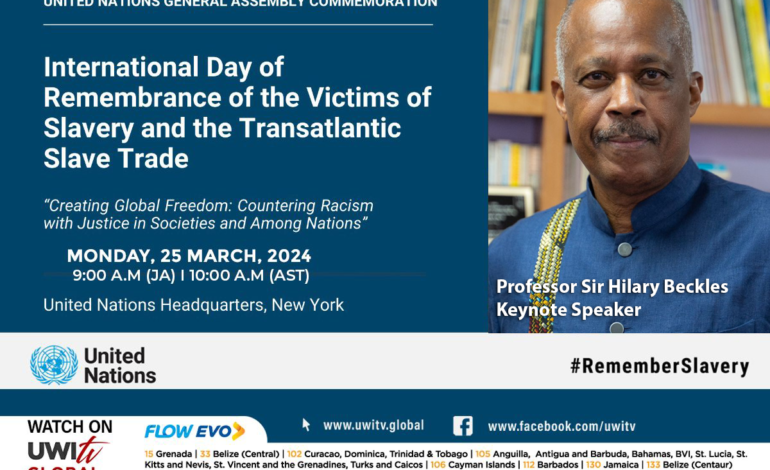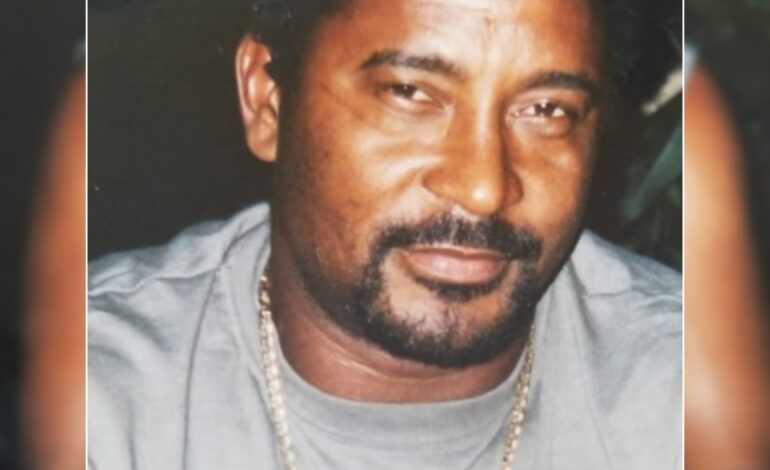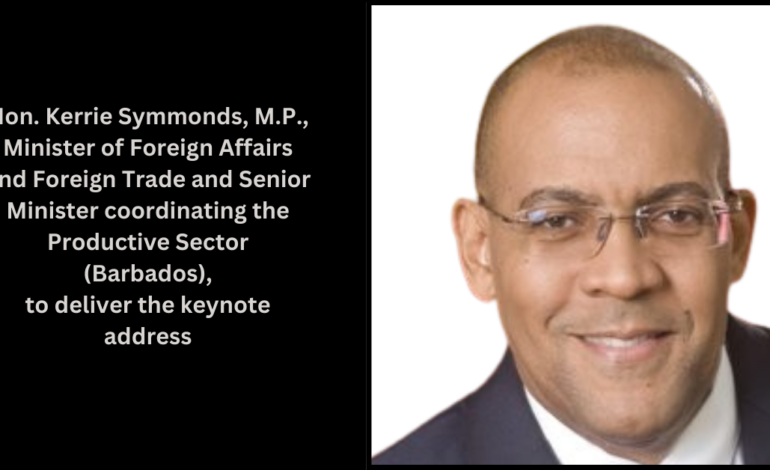
The UWI, Regional Headquarters, Jamaica. Monday, March 25, 2024—Vice-Chancellor of The University of the West Indies (The UWI), Professor Sir Hilary Beckles called on the United Nations to support reparatory justice as a development paradigm. He also urged the UN to recommit to the decolonization agenda for the remaining Caribbean colonies as he addressed the United Nations General Assembly (UNGA) on March 25, 2024. Vice-Chancellor Beckles was the keynote speaker at the General Assembly’s commemoration of the International Day of Remembrance of the Victims of Slavery and the Transatlantic Slave Trade.
The following is a transcript of Vice-Chancellor Beckles’ remarks:
Mr President, distinguished members of the General Assembly, honorable members of the King family, friends and colleagues. Mr President this is a privilege and a joy to address this august body, knowing that you sir, Ambassador Extraordinaire are an alumnus of The University of the West Indies, the number one university in the Caribbean, which I have the honor to lead.
Mr President, we are gathered here to reflect and to project on this day the United Nations set aside in remembrance of this greatest crime against humanity in this our modern era and indeed, arguably in any era of human development.
The Transatlantic Trade in the enchained, enslaved, commodified, chattelized, dehumanized African bodies. This evil enterprise by which Europe and their colonial empires devised a strategy to convert this criminality into capital, the blood of African women, men, girls and boys into a financial bonanza for the high street banks, for governments, families, churches, universities, royal families and common families, has left for us to navigate and negotiate a legacy of human wounds still unhealed. It is now the burden of all of humanity which we must carry. It is the burden that continues to yolk all black folks who continue to suffer the aftermath of this tsunami of economic marginalization, social and cultural oppression, and political victimization in their struggle for freedom and justice and now the struggle to legitimize the reasons for reparatory justice.
As I speak, Mr President, we are calling for justice for the people of Haiti who should have been held aloft for being the first nation to end the evil of slavery. They should have been held aloft for being the most noble exemplars of freedom and the celebration of democratic possibilities in Western modernity. Instead, for their audacity of action they were punished by the Western world and demonized rather than deified. Driven by France and supported by all of Europe and the United States of America, they were forced to pay blood money in the form of reparations for having defeated their enslavers.
Such examples of duplicity and mendacity in our modern world are endless in the bid to end man’s inhumanity to man. Today, we are called upon to bear witness once again to the methods of military barbarity and the ideologies of ethnic hatred not only in our Americas, not only against the African people but as we gaze upon the cruelty in Gaza.
We know all too well the narrative and the tools of terror. We know these narratives, we know these institutions, and the discussions today are about colonization, racism, genocide, apartheid, infanticide, forced starvation, the animalization of images of human beings, these all tools that we see before our very eyes as we gaze upon our televisions. These tools and narratives were honed in the cradle of Caribbean history, where the invention of the chattelization of Africans took its first roots.
Mr President, I was born on the island of Barbados, which became known as the first colony in the Americas where Africans were the majority. Barbados was also the home to the first slave code, the slave code of 1616 where Africans were defined by law as non-humans, as property, as chattel and as real-estate. These tools were never buried nor were they abandoned. Human decency has not been spared. History continues to haunt us in the present and we must unite today as our foreparents united in the 19th Century to end this barbarity of enslavement. We must unite today, all people of goodwill, all people with a passion for humanity at its finest, to end all massacres of innocent people whose only sin is the demand for freedom and justice. We in the Americas and the Caribbean, we know all too well how a few hundred desperate enslaved people would rebel to preserve their dignity but in response, their enslavers would massacre thousands for this audacity, the principle we know very well, that a few will act, but the majority will pay.
As a result, Mr President, I lay this fundamental truth upon your table this day. I do so Mr President with respect to you and to this noble institution. It is this, Mr President, that until the Western world deploys its considerable wisdom and agrees to pay reparatory justly to those who have been enslaved and colonized, to pay reparatory justice for those who continue to suffer the legacies of colonization, apartheid and slavery, to those who have survived this African holocaust, until men and women of good conscience bring to closure the crime of enslavement in the form of apologies and development compensation, until the Western world in which we are all deeply embedded comes to realize and accept that the black people have carried for far too long the moral conscience of modernity, expressed in our terms, expressed in our time, in the superhumanity of Martin Luther King Jr. and Nelson Madiba Mandela, until it is recognised and accepted, that only a reparatory justice framework for development can secure sustainable economic, social, and moral development, that this 21st Century, threatened as we know it is, will take us back to the 16th Century where these crimes against humanity were conceived and concretized.
This Mr President is our fear but we are future-focused. It took us all of the 19th Century to uproot slavery from our civilization. Beginning with Haiti in 1804 to Brazil in 1888, it took all of that long 19th Century to rid humanity of chattel slavery. Then it took all of the 20th Century, all of the long 20th Century, to achieve civil rights, human rights, and nationhood for the descendants of the enslaved. But this 21st Century, this 21st Century, will be the century of reparatory justice. It’s this century that will find and create the greatest political movement, that is the movement for reparatory justice as an approach to inclusive economic development, financial and economic reform, that will turn the world economy the right way up. And therefore, we will not with our silence allow the old persistent inequalities and the barbarity it has bred to find a new beachhead for the launch of further crimes against humanity.
I wish to celebrate all of my colleagues, prime ministers of CARICOM, who in their wisdom have established the CARICOM Reparations Commission with a mandate to create a dialogue for the world on how to perceive and pursue reforms to our financial institutions so that we can have justice not only for historical crimes but we can have a level playing field for the future. That is what we ask, that is what we expect.
When I hear Prime Minister Mottley of Barbados and Prime Minister Gonsalves of St. Vincent and the Grenadines making this moral plea for global reform, supporting the concept of reparatory justice as a development paradigm, I feel proud to be a descendent of those enslaved people who have survived. And we take this matter very seriously.
In my home island of Barbados, the British imported 600,000 enslaved Africans—a small island, 600,000 enslaved Africans over 200 years. At emancipation, there were only 83,000 remaining. How do you reduce 600,000 people to 83,000 over 200 years? Because on that island, slavery was also genocidal. So, this is the moment for all good and humane citizens to join the reparatory justice movement, to come together and to heal the historical wounds that fester before our very faces.
The Caribbean remains one of the few places in the world where there are still colonies. Many of the islands of the Caribbean are still colonies. Britain has colonies, France has colonies, and the Dutch have colonies. Why do we have colonies remaining at this time in our history? I urge the United Nations therefore, as part of its reparatory justice programme, to recommit—to recommit to the agenda of decolonization so that this crime against humanity which began in the Caribbean can finally come to an end with the ending of colonization. The payment of moral and development reparations for the crimes against African people, will at the very beginning represent the formation of a new and more equitable global order that will represent a break from historical backwardness and lay the future for the dawn of a dignified dispensation for all of humanity.
This is the movement Mr President that will signal finally the collective victory of humanity of good over evil. Mr President, I thank you for your generosity.





